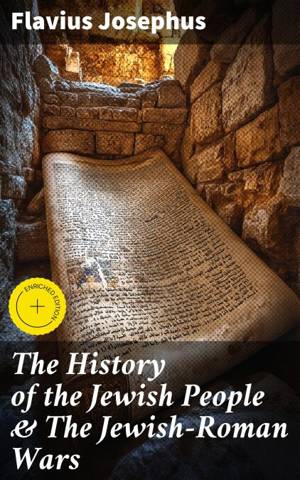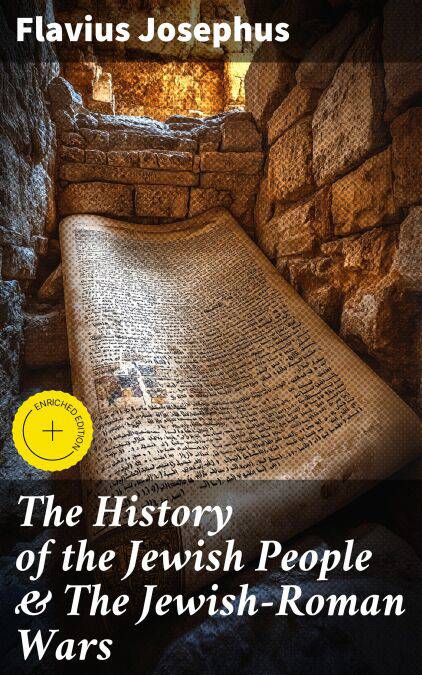
- Afhalen na 1 uur in een winkel met voorraad
- Gratis thuislevering in België vanaf € 30
- Ruim aanbod met 7 miljoen producten
- Afhalen na 1 uur in een winkel met voorraad
- Gratis thuislevering in België vanaf € 30
- Ruim aanbod met 7 miljoen producten
Zoeken
The History of the Jewish People & The Jewish-Roman Wars E-BOOK
Enriched edition. The Antiquities of the Jews & The History of the Jewish War against the Romans
Flavius Josephus
E-book | Engels
€ 1,99
+ 1 punten
Omschrijving
In "The History of the Jewish People & The Jewish-Roman Wars," Flavius Josephus presents a comprehensive narrative that chronicles the Jewish experience from biblical times through the catastrophic confrontations with Rome in the first century CE. Characterized by a blend of historiography and autobiography, the work establishes a unique literary style that intertwines Jewish culture with the monumental forces of Roman power. Josephus employs vivid descriptions and meticulous detail, offering insights into both the socio-political structures of ancient Judea and the fervent spirit of Jewish resistance. Against the backdrop of the Roman Empire's expansion, this text serves as a crucial historical document that captures the intricacies of identity, conflict, and faith amidst adversity. Josephus, a Jewish historian born in Jerusalem, experienced the tumult of the Jewish-Roman Wars firsthand, serving as a military leader before ultimately surrendering to the Romans. His dual heritage'—being a Jew with deep religious convictions and a Roman citizen'—affected his perspective and led him to write this work as a way of preserving Jewish heritage while navigating the complexities of his identity in a foreign dominion. This indispensable volume is highly recommended for anyone interested in ancient history, religious studies, or the sociopolitical dynamics of the Jewish diaspora. Josephus's penetrating insights offer readers an enduring understanding of the tribulations faced by the Jewish people and serve as a powerful witness to their resilience in the face of oppression.
In this enriched edition, we have carefully created added value for your reading experience:
- A comprehensive Introduction outlines these selected works' unifying features, themes, or stylistic evolutions.
- The Author Biography highlights personal milestones and literary influences that shape the entire body of writing.
- A Historical Context section situates the works in their broader era—social currents, cultural trends, and key events that underpin their creation.
- A concise Synopsis (Selection) offers an accessible overview of the included texts, helping readers navigate plotlines and main ideas without revealing critical twists.
- A unified Analysis examines recurring motifs and stylistic hallmarks across the collection, tying the stories together while spotlighting the different work's strengths.
- Reflection questions inspire deeper contemplation of the author's overarching message, inviting readers to draw connections among different texts and relate them to modern contexts.
- Lastly, our hand‐picked Memorable Quotes distill pivotal lines and turning points, serving as touchstones for the collection's central themes.
In this enriched edition, we have carefully created added value for your reading experience:
- A comprehensive Introduction outlines these selected works' unifying features, themes, or stylistic evolutions.
- The Author Biography highlights personal milestones and literary influences that shape the entire body of writing.
- A Historical Context section situates the works in their broader era—social currents, cultural trends, and key events that underpin their creation.
- A concise Synopsis (Selection) offers an accessible overview of the included texts, helping readers navigate plotlines and main ideas without revealing critical twists.
- A unified Analysis examines recurring motifs and stylistic hallmarks across the collection, tying the stories together while spotlighting the different work's strengths.
- Reflection questions inspire deeper contemplation of the author's overarching message, inviting readers to draw connections among different texts and relate them to modern contexts.
- Lastly, our hand‐picked Memorable Quotes distill pivotal lines and turning points, serving as touchstones for the collection's central themes.
Specificaties
Betrokkenen
- Auteur(s):
- Vertaler(s):
- Uitgeverij:
Inhoud
- Aantal bladzijden:
- 2060
- Taal:
- Engels
Eigenschappen
- Productcode (EAN):
- 8596547668558
- Verschijningsdatum:
- 15/11/2023
- Uitvoering:
- E-book
- Beveiligd met:
- Digital watermarking
- Formaat:
- ePub

Alleen bij Standaard Boekhandel
+ 1 punten op je klantenkaart van Standaard Boekhandel
Beoordelingen
We publiceren alleen reviews die voldoen aan de voorwaarden voor reviews. Bekijk onze voorwaarden voor reviews.







